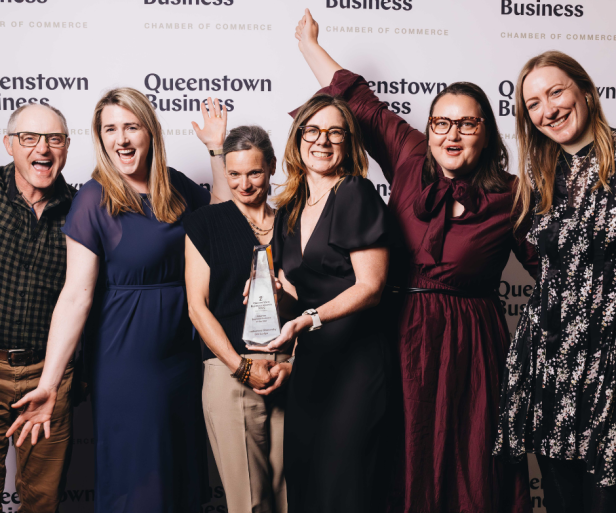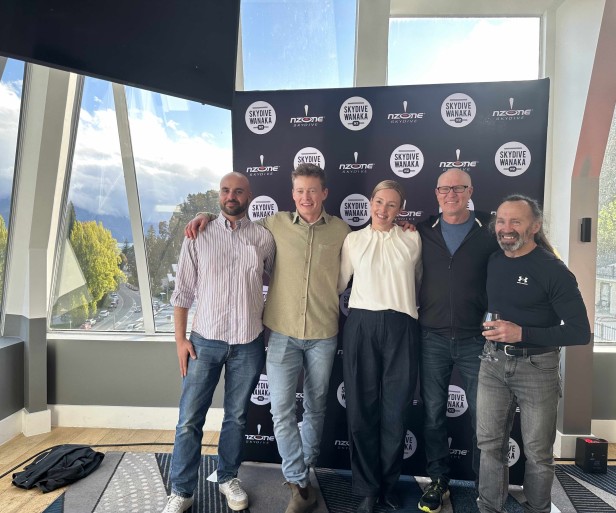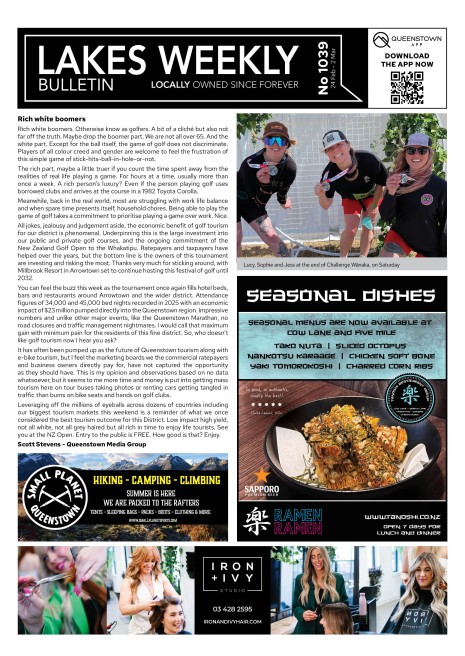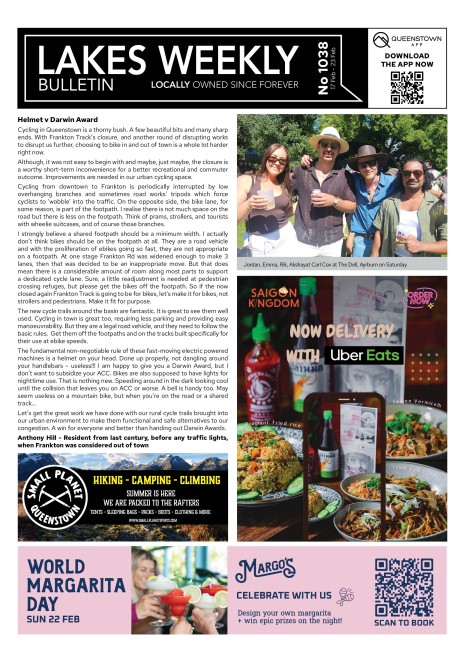Could technology help us overcome the labour shortage?

Tech solutions could help to alleviate staff shortages and improve productivity for Queenstown Lake’s struggling hospitality and tourism sectors.
Business owners throughout Aotearoa are facing labour shortages and the New Zealand Institute of Economic Research’s (NZIER) latest quarterly survey of business opinion found that companies were still feeling downbeat in the September quarter. 9% of businesses reported capacity as the primary constraint on their work and while shortages in skilled and unskilled labour are easing, we’re still not where we should be.
But sourcing more labour might not be the silver bullet.
According to OECD figures, New Zealand’s productivity is below average when measured in GDP per hour worked, and it’s because we’re working hard, but not smart.
OECD are the Organization for Economic Cooperation and Development, and they work to create policy standards and promote sustainable economic growth amongst 37 countries including the UK, Australia, America and countries throughout Europe.
Kiwis are lagging behind and this has been accredited, in part, to our lack of adoption of technological tools.
According to OECD figures, Aotearoa’s annual average hours worked per worker was only 4% more than the average, however, our labour productivity is low. Ireland led the charge – said to be working smarter, not harder – by investing in tech and the talent they already have. Their GDP per hour worked was sitting at over $160, we, however, are sitting in 25th place at around $80 of GDP per hour worked. We’d have to work a whopping 10.7 hours a day longer to produce the same amount as Ireland – that’s an impossible 53.5 hours a week more.
So, how do we work smarter and boost productivity?
Artificial intelligence (AI) is one thing that can be implemented by businesses to improve productivity. This software can allow applications to become more accurate at predicting outcomes and ease the workload on humans. It isn’t intended to take away human jobs or interactions, but rather to make things easier and create a better customer experience. Pradeesh at QRC teaches the Certificate in Machine Learning and believes it’s a great course for business owners to understand and begin to implement AI into their every day.
“I think that we need to embrace newer technologies such as ChatGPT. One thing we teach here is that tech is here to stay, but we need to be responsible,” says Pradeesh.
“We can’t just throw AI in with the kitchen sink without understanding it – it’s really important for us to understand that. Machine learning isn’t really fancy – I will give an analogy of being a smart student; imagine that every student managed to read all the books, all the Encyclopaedias and have all the knowledge there is – you’re like a walking Wikipedia. That’s what AI is. It can just spew out answers.
“It has learnt from us that there are biases among genders, among races, so AI can be biased towards a certain group of people or a minority group of people – we need to understand this bit and that’s why we talk about responsible AI. Embrace technology, understand how AI works, but know its limitations, where these come from and how we can counteract that.”
AI technology can answer questions regarding reservations or availability, translate menus or booking information and aid in communication. It can take away mundane tasks for staff, allowing them to focus on providing excellent service and tasks that can only be carried out by humans. This tech also learns as it goes, so it will become smarter and more intuitive over time.
If AI still isn’t appealing, there are plenty of other tech solutions out there to make business life easier. Tools exist to speed up jobs such as the cloud-based invoicing programme Xero, which will create invoices, track cash flow, capture bills and receipts, and automate accounting admin. HR software such as Bamboo HR can store employee contracts and work permits, set automated task reminders for Visa expirations, and automate onboarding. There are also payroll systems, such as Crystal Payroll, which allows employees to fill in their timesheets, can integrate with accounting systems, and manage holiday pay calculations.
Enterprise resource planning (EPR) is another piece of software that some businesses use to manage and automate complex processes. The system manages and brings together processes like Point of Sale, accounting and inventory management under ‘one roof’ – so that people can see how their business is operating at a glance. New Zealand-based company QONTRO offers a cloud-based ERP system and believes that investing in this tech will innovate business processes to boost long-term productivity and resilience. They say that this technology reduces the time required for repetitive, time-consuming tasks, whilst simultaneously providing valuable new insights through reporting and analysis tools.
Local business, Loaded, offers a programme for restaurants and cafes that manages revenue, labour and cost of goods in real-time from one software hub. Its features include a budgeting tool that enables users to set targets by the same day of the week last year, a real-time wage analysis that connects to the payroll system, and a rostering tool. They also offer smart stock management that delivers an 8% reduction in the cost of goods, and a comprehensive reporting tool that is customisable.
Loaded says it’s helped customers gain profitability and improve their efficiencies, and as a result, are looking to expand across the ditch to Australia. They recently raised $3.25 million through a combination of equity and debt, and are looking forward to investing further in product development and their team.
First Table has recently released Regular Table – a new booking system that enables real-time booking at restaurants. Founder and Chief Executive Mat Weir told Stuff, “The revenue potential going from booking just the first table of the night to monetise any table of the night even across our existing network is ginormous.”
The company realised that customers were using First Table to not only book the first table of the night but also to read reviews, discover good restaurants in cities and were happy to do regular bookings.
Whatever the business you’re in, there’s technology out there to streamline processes and take away the repetitive tasks that people generally do more slowly. And being human, we’re more likely to make mistakes.
Where we go wrong, it seems, is in finding, adopting and integrating this technology into our businesses. While many businesses are beginning to adopt technology, we’re some way from catching up to our Irish counterparts.
Additional staff and working longer hours aren’t viable solutions to New Zealand’s lag in productivity. Technology such as AI, apps and software programmes will allow us to work smarter, not harder, and future-proof the hospitality and tourism industries. Technology won’t take our jobs away, but simply free up more time for important human tasks.
Over the past decade, New Zealand’s productivity has plateaued – we’re on a similar trajectory to Columbia. This isn’t due to a lack of hard work, but rather a lack of adaptation of new tech. The OECD’s 2022 Economic Survey of New Zealand recommended a greater focus on digitisation to boost productivity and put us on level-pegging with other countries. They advised that digital skill acquisition will make economic growth sustainable, inclusive and resilient, and will help to overcome labour shortages in the country.









